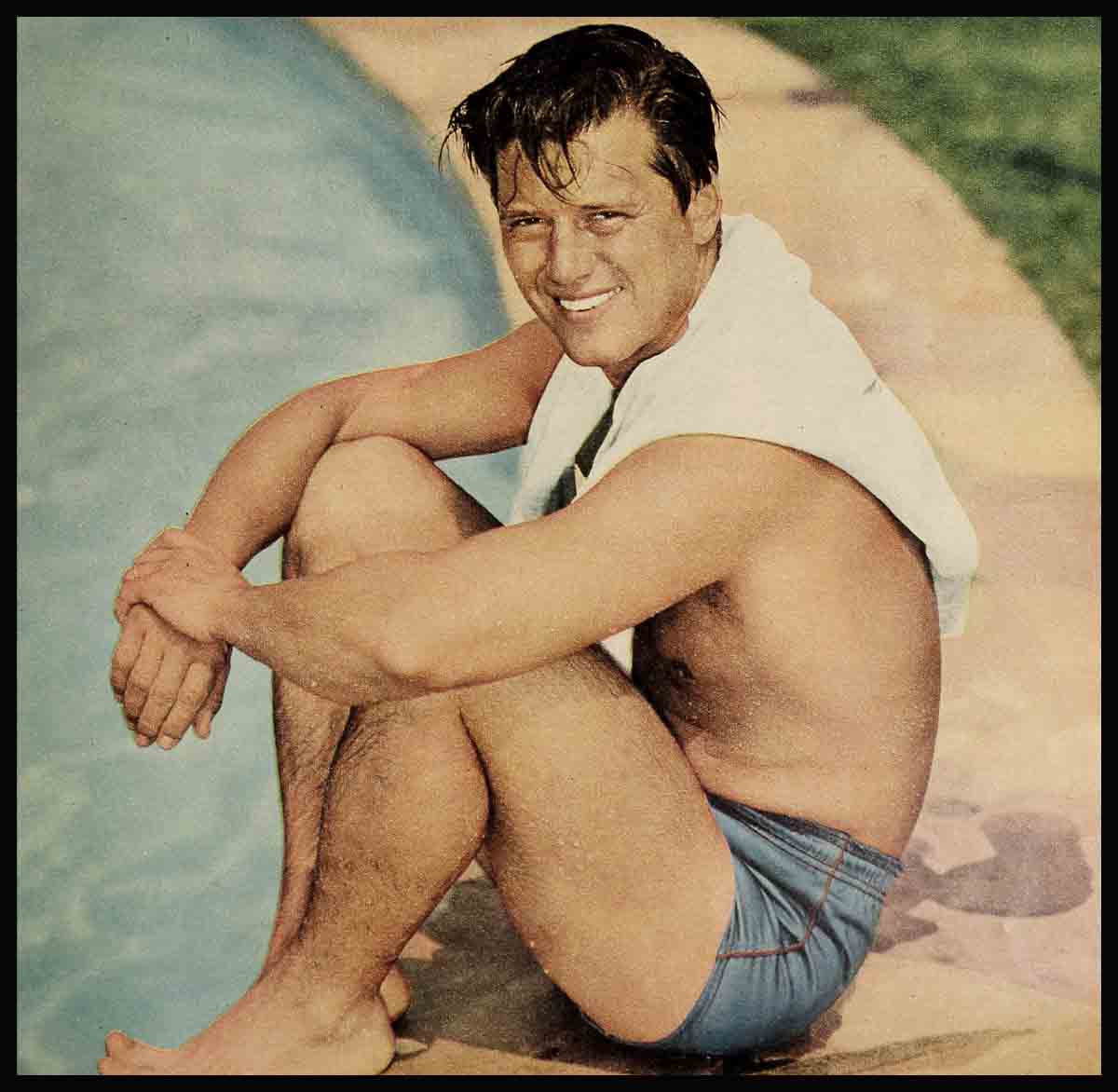
No Time For Modesty—Gordon MacRae
A stocky, square jawed young guy with friendly, hazel eyes and a spacious grin breezed into a Hollywood NBC rehearsal studio a few weeks ago and up to an attractive, smiling girl standing by the mike.
“Hello, Margaret,” he greeted her. “It’s swell to see you.”
“Hello, Gordon,” she answered. “It’s wonderful to be here.”
He took her by both hands then leaned over and planted an enthusiastic kiss on her cheek.
Secret Service men stiffened. Chaperones gasped. Even the radio technicians, used to all kinds of sights in Hollywood, almost dropped their earphones. But all this consternation was lost on Gordon MacRae, who was the kisser, and on the kissed, too, who was Margaret Truman, daughter of the President of the United States. Nobody guessed that they were old friends who had met before in Washington and that Gordon was warmly glad to see Margie again and have her sing with him on his show, “The Railroad Hour.”
The onlookers’ astonishment was compounded when, right after the pair went to work, they heard MacRae boldly suggest, “Look, Margaret—you’re singing too high above my baritone. Why don’t you drop down a third? You won’t have to reach for the high ones then and you can’t go flat.” To which Miss Truman immediately replied, “That’s a good idea. Let’s try it.”
The harmonious results of Gordon’s impetuous suggestion soon showed on the air. So much so, in fact, that afterwards, driving home with his wife, Sheila, Gordon pulled up at a Western Union office and impulsively scribbled a telegram saying how great Margie was on his show and how much all the gang loved having her. He sent it off to the White House, Washington, D.C. And he got back an appreciative, personal letter bearing an internationally famous signature.
By doing what comes naturally, whether it’s giving the President’s daughter a hearty smack in public or bursting into full throated song while ambling down the street, Gordon MacRae has earned a certain reputation in Hollywood for being cocky, super self confident, even bumptious and. brash. He’d be the last guy in the world to deny any of these estimates, by the way, also the last to dream of changing himself. “I’m strictly a square,” hell admit cheerfully, “I act first and think afterwards,” which trait, hell further confess, has brought him transient trouble at times, but usually kept him out of it. In fact, being nobody but Albert Gordon MacRae, morning, night and noon, is exactly what has brought him his triple threat fame, a lovelaced marriage, a happy home and a busy world which, to him, is one large, succulent oyster.
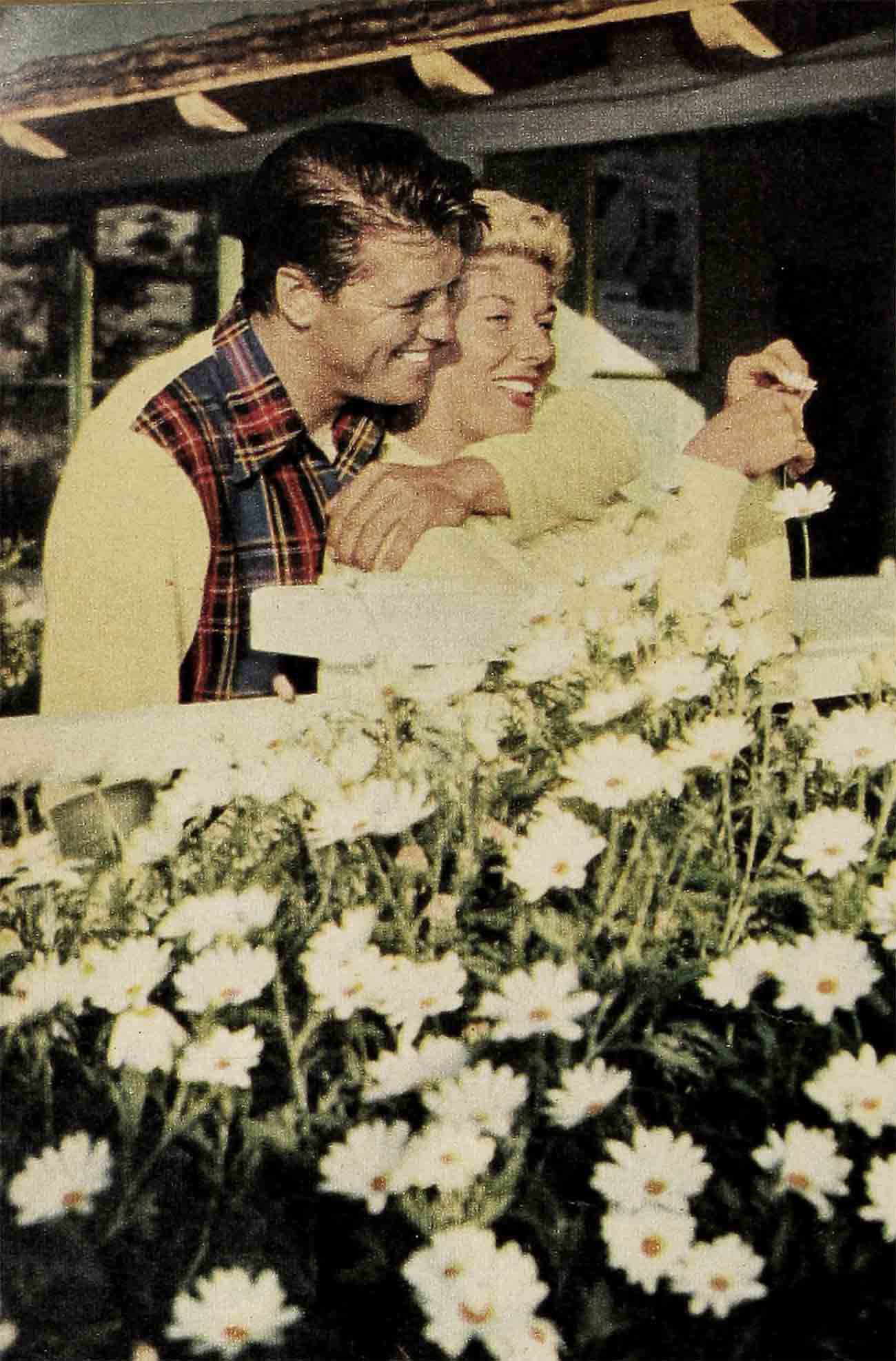
Right now “Nature Boy,” as Phil Harris calls him, is sitting on top of that world—a favorite singer on radio and records and the hottest male attraction at Warner Brothers. Right now “Muscles” MacRae, as Bing Crosby addresses him, is having the time of his life doing everything he’s dreamed about doing since he was four years old, and at 31 he figures he’s just getting going. The other day, after belting out a song in a manner which particularly pleased him, Gordie sighed appreciatively at his own efforts and spake thus: “I am probably the best darned young baritone in captivity—or could be” he qualified, “with a lot more work. Someday I’m gonna sing at La Scala!”
And again, on a recent afternoon when he had swatted out a tidy 68 on the Palm Springs golf course to trim the ears off the local pro, he said something else concerning another ambition next to his confident heart. “If I can just spring myself with The Desert Song in the can and tape some radio recordings ahead, I’ll go to England this summer for the British Amateur and the Open. Looks like I’m ready at last, and who knows? Maybe I’ll win em.” Thus fired up, he ripped off another round for a disastrous 79—but that fiasco dampened his sporting ardor only fleetingly.
The truth is that Gordon MacRae is the original, incurable optimist, an affirmative full-of-beans character who’s never nursed an inhibition in his life. People who call him a “canny Scot” on the strength of his bagpipe handle are only talking to the birds. Actually, Gordon MacRae’s ancestry is as much German as it is Scotch, but more actually he’s the prototype of the all-American go-getter—reckless, aggressive, confident, and ready to shoot the moon, if there’s an outside chance of hitting it, which he invariably believes there is. He’s never played a card close to his vest in his life (and at poker he’s deadly). He’s never pussyfooted, hesitated, cavilled or gazed at the world over a dour frown. He’s never hoarded anything—money, love, friendship or talent. He’s not rich today; in fact, he’s in debt, although he collects around $250,000 a year and keeps nine cents on the dollar of it after taxes. He’s still paying for the Cadillac he bought in 1947, and not too long ago with hardly more than that tax money in the bank he looked at a $70,000 house his Sheila liked and bought it that afternoon. “Because,” he explained with MacRae logic, “it was just right for us and besides the fellow who’d lived there had raised the same family we have—two girls and a boy—wasn’t that wonderful?”
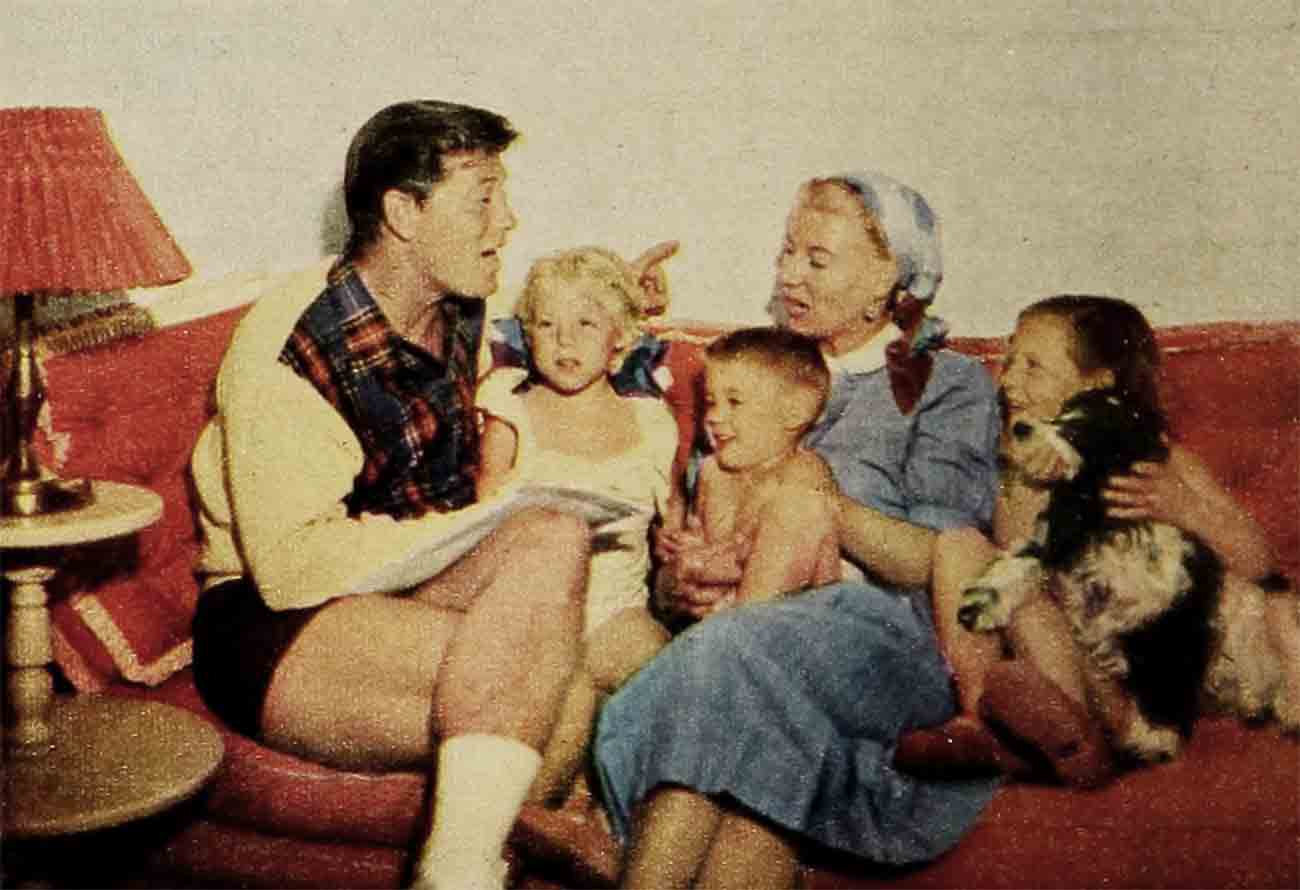
That may not be the most cautiously conventional way to acquire real estate but Gordon MacRae couldn’t be cautious or conventional about anything if he tried. Whether it’s sporting a green Tartan dinner jacket at a formal Hollywood affair, as he did once, or donning a silk top hat, which nobody’s worn since the days of Valentino, for a Boulevard premiere, he acts as he pleases and obeys every impulse. Rules just don’t dig him. Once, back East, Gordon got mobbed at a theater by a bunch of predatory teen age dolls. One swiped his handketchief and raced up the street. MacRae raced after her for three blocks, caught her and snatched it back. “Hey, that’s mine,” he said, “I want it.”
Last Christmas, Gordon planned a big surprise for Sheila—the mink coat she’s wanted for so long. With half the 14 rooms in his house still unfurnished, he certainly couldn’t afford it but that was a small item to Mac. So he bought a beauty and took almost FBI pains to keep it undercover for the big morning. On Christmas Eve the furrier delivered it to him stealthily at Lakeside Golf Club and Gordon sneaked it in the back door at home, buried it under blankets high in a back closet. Then that evening, setting out for a cocktail party, Sheila happened to mention that it was a cold night and the cloth number she had might be chilly. So Santa MacRae raced back for the box, ripped it open and threw the premature surprise over her shoulders, after all the weeks of secrecy. “Here,” he said, “maybe this will keep you warm.” That’s the kind of a Joe he is—just has to do what he feels like doing, right now and all the time.
What Gordon MacRae feels like doing most of the time is singing. He vocalizes every day of his life, no matter where he is—in the shower, hustling around the Warner lot, dining at a cafe, or slamming a pill on the Lakeside golf links. Members at the Lakeside clubhouse always know when MacRae’s playing golf—they can hear him. As Bing Crosby has quipped, “When Muscles joined the club, seven crooners quit in disgust.”
Mac himself tells a story about the time when he snagged a tiny singing role in his first Broadway musical. Between acts the weary principals flopped on couches, closed their eyes, their tonsils and rested. But Gordon kept on practicing his notes back of the wings. Finally one of them asked him sarcastically, “Gordon, do you know a song called, ‘You’d Better Go Now’?”
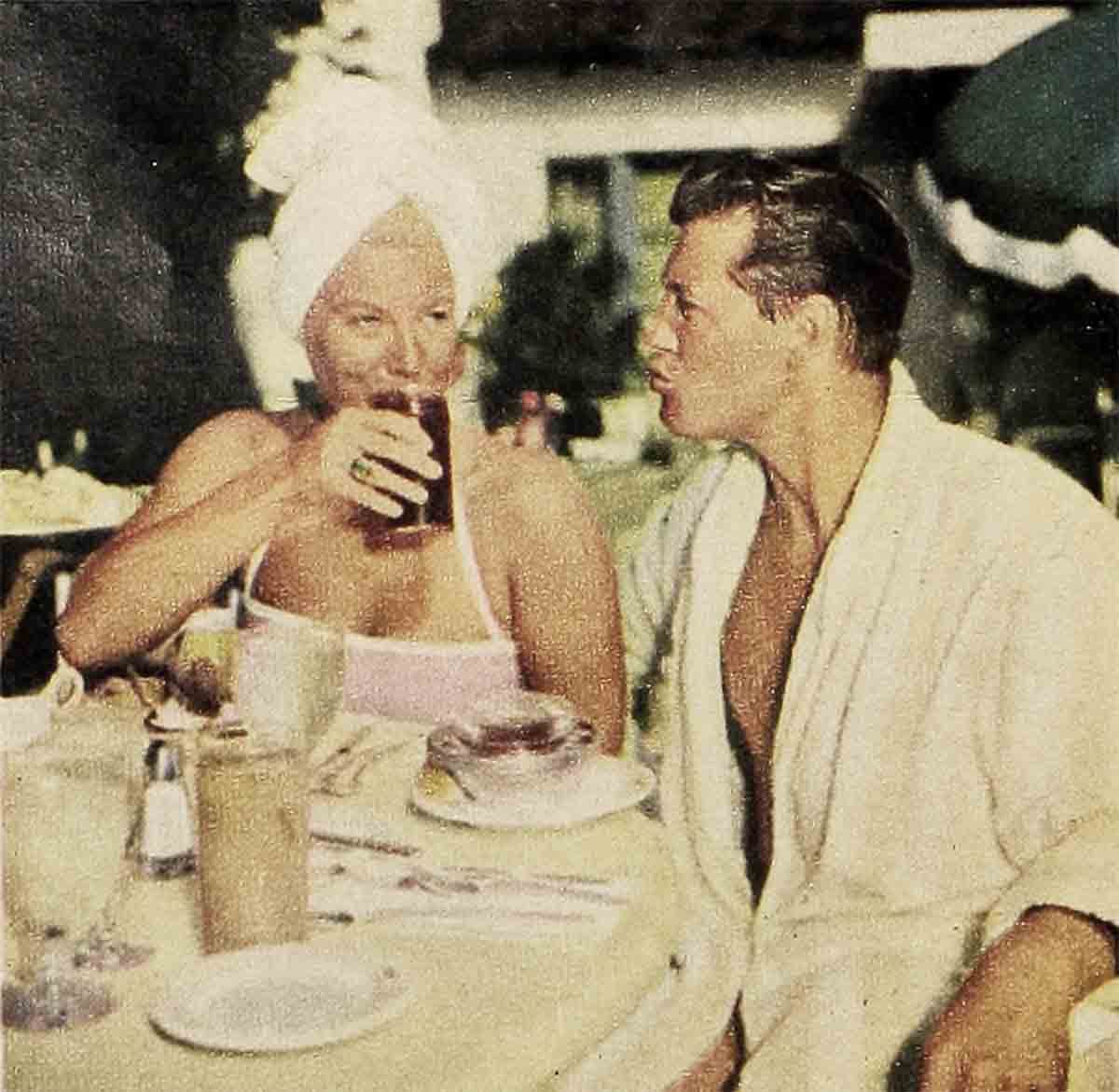
“No,” he replied gullibly, the hint floating right over his head, “but I’ll look it up and learn it.”
Yes, the boy likes to sing. And what he likes to sing best are his operettas on “The Railroad Hour” where he’s been keeping pace with such Metropolitan Opera talent as Dorothy Kirsten, Rise Stevens, Pat Munsell, Blanche Thebom et al for the past five years. He loves that job above everything. But he loves golf too, has ever since boyhood when he won the New York State Juvenile Handicap cup. So, about those irresistible impulses of his—
One Sunday morning when Gordon was fairly new to Hollywood and just clicking on “The Railroad Hour” he got a phone call. “Hi,” said a husky voice. “This is Bing Crosby. How about a game of golf?”
As with most young singers, Bing was Gordon’s idol, and the prospect of matching mashies with the Great Groaner made his pulse pound. But Gordon had a long Sunday rehearsal—one to four—he knew if he played golf he’d never make it back in time. He wrestled briefly with his conscience—and he lost. He called up the producer, “Got a cold, kind of hoarse,” he said, “about that rehearsal today—”
“Stay in bed—take care of yourself by all means,” counselled his anxious boss. “Don’t take any chances with tomorrow’s show.” Relieved, Gordon grabbed his bag of clubs, and soon teed off with his idol, Bing, way out at Bel-Air.
Well, on the first hole he canned a neat birdie. On the second he collected a par. On the third his high, arching five-iron dimpled the green, scampered straight for the cup like a home-coming gopher and plunked out of sight for any golfer’s dream shot—a hole-in-one!
Bing was delighted. He ordered the ball mounted on a silver trophy, spread the news around the clubhouse and of course the newspapers picked it right up. And the next day when Gordon showed up at NBC, a little sheepishly, what he got was, “I see by the papers that you were a very sick boy yesterday!” But in justice to Gordon it should be reported that the operetta he was singing he knew backwards and forwards already. Furthermore, it’s the only time in his life that he every hookeyed away from work, or wanted to—and in his case you might reasonably call the lure of a golf match with Crosby an extenuating circumstance.
Usually, the question of work versus play is a conflict which simply doesn’t exist with Gordon MacRae. The line between the two, in his consciousness is so fuzzy that he’d really have a rough time picking it out. It may sound corny, but actually Gordon was born to sing. He never wanted to do anything else, so to him work is play, and he eats it up. As to his self-confidence, he has a ready answer.
“Confidence,” he’ll tell you with no false modesty, “is nothing in the world but knowing your stuff, and that in turn comes from working hard and you don’t work hard unless what you’re doing is what you’re crazy about. I’ve worked because I wanted to. I wanted to learn to sing the best I could. Now I know what I’m doing, so what I’m doing doesn’t. rough me up.”
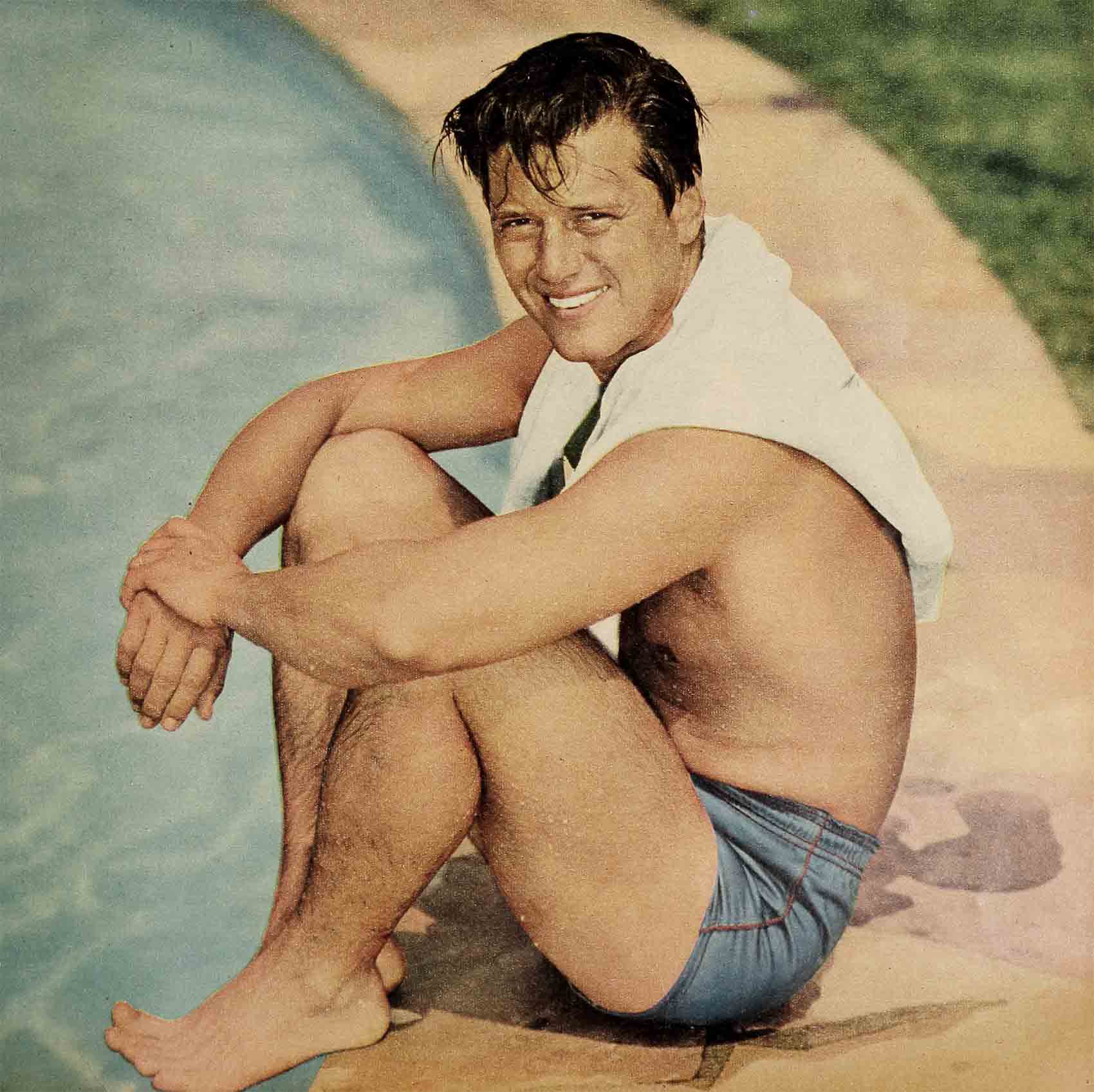
Gordon isn’t a big man, but he’s as sound as a rock. He’s five-feet-eleven in his socks, and usually weighs in at 170. His father was a strong man before him. Gordon has never been seriously ‘sick, today he collects about three colds a year and he doesn’t know a Hollywood doctor’s name or phone number. He swims every morning in his pool at home, slips in a golf game somehow, even when he’s working (Lakeside’s only a brassie shot from his studio). He’s early to bed and early to rise, drinks lightly, eats ravenously and works it right off. At every studio break he’s off to the mountains to rough it. That “Nature Boy” tag of Phil Harris’ is really no gag, but Gordon MacRae all over; the outdoors has set his pattern for health ever since boyhood when he used to shatter the sleep of his neighbors whistling at dawn for his pals to hike for the wooded creeks and ponds around Syracuse, N.Y. with a can of worms, bent pins and a bobber. He played football, basketball, baseball and lacrosse in school and from all of that collected only a trick knee which bothers him sometimes when he dances. Otherwise, the results have been markedly constructive.
Although he’s built like a light heavyweight he’s never had a scrap in his life or even come close. There used to be a tough kid named Jack Sweeney in his home town who occasionally roughed him around but one day when Jack’s baby sister tumbled out of a tree Gordon caught her and saved a crippling fall. After that Jack never bothered him, and maybe it taught. him a lesson. Gordon didn’t need one. The father he adored early taught him the precept of “turn the other cheek,” although usually he doesn’t have to. People don’t pick on a guy like MacRae, and he doesn’t flare to anger easily himself. He’s spanked his children only once, and that was when he caught Meredith, his oldest daughter, turning on the gas jets and figured he’d have to impress her for safety’s sake, or they’d all get asphyxiated. But that experience was twice as painful to him and he’s never done it since.
This doesn’t mean that Gordon MacRae is in any sense a softie inside. On the contrary he’s never been wanting in any kind of courage. Last fall, after finishing About Face Gordon took off on a fishing trip to Lake Mead back of Boulder Dam where the bass are big, hungry and belligerent. He lured along some companions from the studio who weren’t as experienced in outdoor sports as he is, so when the boat they hired conked its motor out right above Roaring Rapids, and the anchor slipped, there was bad trouble.
It drifted, of course, right into the narrow neck where the water was running 25 miles an hour and cold enough to crack a thermometer. The rocks ahead were wicked, there was only one thing to do. Gordon yelled, “Jump for it!” and jumped with the others after him. But they weren’t all young and husky as he was. One man, in his fifties, couldn’t make it to shore against the fast current, another got swept into a 30 foot hole. Mac saw what was happening and didn’t hesitate. He jumped back into the stream, grabbed the men and helped them back inside the boat. Then he climbed in himself and off they all shot, careening through the foaming race that roared destruction around every boulder.
After the wild ride was over and they were all panting on the pebbly shore in the sun, the middle-aged pal reached over and took Gordon’s hand. “Thanks, Mac,” he said.
“What for?” came back MacRae. “I was saving my own skin too, wasn’t I? Besides,” he grinned weakly, “I wouldn’t have missed that ride for a million bucks.” But just the same he was plenty scared and he admitted it, and there have been other times, too.
Once, down at Ellington Field in Houston, Texas, where he was earning his navigator’s wings during the war, Gordon went up in a Lockheed trainer whose pilot suddenly swerved into a speed bank that sent him rattling back in the ship like a loose bolt and grabbing for the escape door. Luckily, before he could open it, the plane, which being green he was sure was headed for a crash, straightened out and flew right. Luckily that is because, as he discovered when they landed, his chute was on cockeyed and if he had jumped he’d have planted himself like a potato from 3000 feet up.
At times like that a man has a right to sweat a little, and Gordon MacRae is only human. But as for moxie of the moral sort, there’s nothing on his record to show that he’s ever funked any kind of decision or responsibility—and he’s had some very adult ones since he was twenty years old.
On last May 21, Gordon and Sheila MacRae celebrated their eleventh wedding anniversary. He had turned 20 just two months before he took the vows, was only two years out of prep school, and his prospects consisted of a precarious $50-a-week job with Horace Heidt’s band, from which he was later fired. Reviewing their romance recently, a Hollywood reporter asked Mac, “Weren’t you scared taking, on a wife so young without any money to support her?” Which question only struck Gordon as silly. “Seared?” he puzzled, “What do you mean? I was in love!”
Gordon first laid eyes on Sheila Stephens, the blonde, British born beauty 11 years ago when she interviewed him for a spear-toting job at the Millpond Playhouse on Long Island. Their meeting and subsequent romance has been well and often described—but one angle to it hasn’t. Gordon didn’t enroll at that straw-hat theatre to meet Sheila Stephens, and he doesn’t go there primarily to act. The reason Gordie sought a job near Roslyn, Long Island, in the first place, was because he had tumbled for a schoolgirl in Switzerland the summer before when he sang his way to Europe and back on a boat. It was because this girl lived in a nearby town that MacRae headed that way. Only, to show you how fast Mac knows what he wants, goes after it—and gets it—the minute he saw Sheila he switched compass points without wasting a date or a look the other way. And throughout the cold winter which followed he plodded four miles on foot through the snow to court Sheila.
She gave him a hard time at first on that project so it took a while but with Bulldog MacRae, Sheila didn’t have a chance to say “no” and she knew it. He popped the question one night before a credit jeweler’s window in Radio City where he was making exactly five bucks a day as a page boy, and at her first shy nod whisked her in and bought the ring, a microscopic stone so tiny it still falls out of the setting.
It hasn’t been all a Merrie Melody, of course, or strictly candy and cake. Marriage never is. Gordon and Sheila have had their ups and downs, ranging from the time Cadet MacRae had to borrow 50 dollars from the Red Cross to pay his bride’s hotel bill in San Antonio, through the luckier stretch when he landed on the Texaco Star Theatre and a Broadway show, Three to Make Ready at the same time. That’s when he collected $400 a week and spent every dime on a fancy apartment in the swank East Sixties, a nursemaid for Baby Meredith and high old times around Manhattan. Now there’s Hollywood. Along the way there have been troubles to meet and facts to face, the kind that make a boy and girl not just two people living together but a team.
They’ve had their feet on the ground, domestically speaking, since one day years ago in Chicago which proved to be the turning point of their marriage. That day Sheila, who was an ambitious actress herself and is still a good one, tried out for a part in a road company, got it, at three times the salary Gordon was making, then tearfully turned it down because it would keep them apart. She was only 18 then but she’s never regretted it for a minute because stacked up against fame look what she’s got—Gordon, Meredith, Heather and Gar, and a MacRae family share-the-success plan for them all, including the kids, which cuts everybody in on everything their old man does. Even the moppets are welcome wherever he works, and Sheila goes everywhere he goes—even up into the Sierra on camping excursions, where the last time her sightseeing nag peered over a thousand foot cliff and almost dumped her, her husband dropped their dinner in a trout stream and man eating bears—she swears—growled around their tent all night. More her style are the frequent trips to New York, where, if Gordon’s singing, she sits rapt through every performance and then lets him take her out to the Blue Spruce Inn where they used to meet, or their favorite bistro, the Epicure, and occasionally clear up to Jones Beach where, as Mac sometimes grins crudely right in front of his wife, “we used to go-and neck.” And even today, when Sheila strolls out by the pool in her bathing suit (she’s designed like Venus) he’ll wolf-whistle and then act surprised, “Why, it’s only my wife!” Which he knew, of course, all the time. But he means the whistle. “Someday,” she’s warned him, “you’re going to whistle at the wrong girl and get your face slapped.” But he doesn’t think he’ll make that mistake.
While she’s pretty soft on her man and proud of him too, Sheila MacRae would be the last girl in the world to claim that she owns the model husband. For one thing, he’s inclined to get tied up too often and stay too late with the boys at Lakeside and show up when dinner’s cold. For some others, he wrecks everything he sets out to fix around the house, hates to go dancing, is by his own admission the third worst dressed man in Hollywood (Monty Clift and Marlon Brando come first), drives his car too fast, and sometimes falls asleep at dinner parties (he even snored at Dean Martin’s the other night). And about business and money matters he’s a self confessed “pathetic babe in the woods.”
His manager, Jerry Rosenthal, now has Mac on a tight allowance of $17.50 a week, nothing to paint the town red these days, but obviously a sound fiscal maneuver. There are occasional dollar limit poker games which go on sometimes when Gene Nelson, Jeff Chandler, Dean Martin, Pete Lind Hayes or some other of his closer pals shut the girls out for some hands of dealers’ choice—or of course a slight “nassau” stake on the links with Bing, Bob Hope, Forrest Tucker or the pros, Ed Dudley and Harry Cooper, with whom he likes to match sticks.
Gordon had only one friend in Hollywood when he arrived—Bill Orr—the Warner talent executive who found him in New York and brought him out. By now he has hundreds, including Bill, of course. With MacRae his friends know where they stand. One lady, for instance, asked him and Sheila over socially one night, then made it pretty plain she had him there strictly to sing and entertain her guests for free. Gordon sang, all right. He didn’t send her a bill as Will Rogers once did in a similar circumstance, but he never went back to her house. On the other hand, if he likes anybody he’ll give him the shirt off his back.
No one who knows him has ever underestimated the size of Gordon MacRae’s heart, and if sometimes he uses it to think with instead of his head, perhaps he can be excused. It’s not a bad failing. The habit may not win him stacks of gilt edged stocks and bonds or acres of oil wells, which seem to count most with some Hollywood stars, but he’s not the type to worry much about that. Maybe he’s crazy to long for the Met and La Scala, the British Open, a fishing lodge at Tahoe which right now seem straight out of dreamland. And maybe he’s not. They don’t ever come true unless you dream them first.
THE END
—BY KIRTLEY BASKETTE
It is a quote. MODERN SCREEN MAGAZINE JULY 1952




